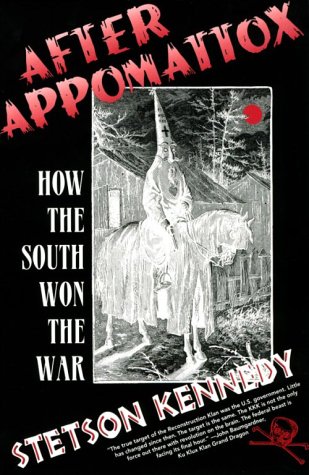"Along with his wonderful abilities as a writer and scholar, Stetson possesses enormous courage, social involvement, and a big heart. . . . He's a brave man, of great conscience, and ought to be accorded a seat alongside Patrick Henry and other great freedom fighters."--Alan Lomax, Association for Cultural Equity
"Throws a clear light on events of the post-Civil War era as they relate to current divisions of class and race in contemporary society. Kennedy's interpretation runs against that of many other scholars, but certainly it is well supported and coherent and has the added force of strong argument."--Patricia Waterman, University of South Florida
Stetson Kennedy's premise--argued and documented here as never before--is that the verdict of Appomattox was largely reversed during Reconstruction. The determined southern oligarchy, he says, wrenched political and cultural victory out of military defeat.
In this dramatic contribution to the history of Reconstruction, Kennedy brings to light thirty-three "long-buried" testimonials from victims and perpetrators of Ku Klux Klan terror that were taken by a Joint Congressional Committee in 1871-72. They form the core of this account of the decade following the Civil War, which Kennedy describes as a period of "Holocaust, demagoguery, chicanery, fraud, and psychological warfare that culminated in the Deal of 1876."
That "deal," struck between Democrats and Republicans in a smoke-filled room of the Wormsley Hotel in Washington, D.C., essentially revoked the unconditional surrender of the South at Appomattox. It gave Republican Rutherford B. Hayes the victory in the disputed presidential election of 1876 in return for the withdrawal of federal troops from the southern states, and Kennedy contends that it diluted the power of the hard-won 14th and 15th Amendments and led to the imposition of the Jim Crow system after Reconstruction.
Work on After Appomattox began with Kennedy's discovery of thirteen volumes of testimony--given to a Senate committee by former slaves--housed in the Schomburg Center for Research in Black Culture in the New York Public Library. The interviews--chilling, heartbreaking, and plain-spoken--describe how "the black and white targets of the Klan terror chose not to arm themselves or bond together for protection, counterattack, or counterterrorism. They simply stood as individuals against their tormentors, and, for refusing to renounce their rights, were often killed." Citing the testimony of one former slave, undeterred from voting by a near-fatal flogging, he quotes, "I can be strong in a good cause."Stetson Kennedy is the author of Palmetto Country, Southern Exposure, The Klan Unmasked, and Jim Crow Guide: The Way It Was, all reissued in paperback by UPF. He has received numerous honors recognizing his work for peace and racial equality, from the Negro Freedom Rally People's Award in 1947 to the 1991 Cavallo Foundation Award for civic courage.
The grandson of a Confederate officer, he is a native of Florida and lives in Jacksonville.
- ISBN13 9780813013886
- Publish Date 20 September 1995 (first published 1 April 1995)
- Publish Status Out of Print
- Out of Print 3 October 2008
- Publish Country US
- Imprint University Press of Florida
- Format Paperback
- Pages 331
- Language English
